Robert Plant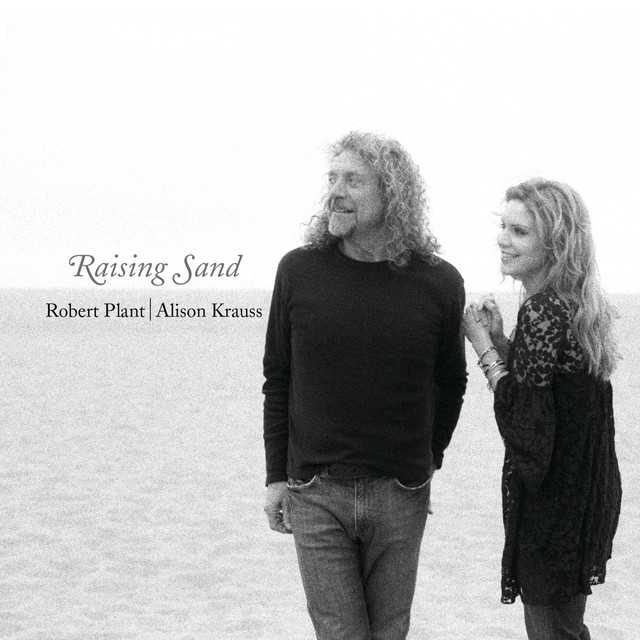 | ||
| Allmusic Biography : In 1968, a naïve young singer from the Black Country hills in England named Robert Plant was discovered wailing the blues by veteran session guitarist Jimmy Page and bassist/keyboardist John Paul Jones. When Plant recommended his friend John Bonham as the drummer, one of the most successful bands in rock history was born: Led Zeppelin. But the group that started with such force also ended in flames after 12 years, as Bonhams death from alcohol poisoning in 1980 split the band after nine albums. The remaining members went their separate ways, but Bonhams death hit Plant particularly hard. Starting his solo career in 1982 with his Zeppelin-like Pictures at Eleven album, Plant would use a slew of great drummers over the next few years, including Phil Collins, Cozy Powell, Barriemore Barlow, and Richie Hayward. Collins appeared on the 1983 follow-up, The Principle of Moments, and Plant achieved a lighter touch somewhere between Genesis and Zeppelins quieter side with tracks like "In the Mood" and "Big Log." But the singer would feed his Elvis Presley infatuation on 1984s The Honeydrippers, Vol. 1, teaming with Page and other guests on influential roots rock material. Refusing to be typecast, Plant then threw a major curve with Shaken n Stirred, the 1985 album that approximated new wave through the synthesizer embellishments of keyboardist Jezz Woodroffe and guitarist Robbie Blunt, plus Haywards use of electronic drums. It was a creative highlight of his career, but despite a hit in "Little by Little," the album sold poorly, and the rumblings about a Zeppelin reunion mounted. Plant took the next few years off, then answered the call for Zeppelin material with 1988s Now & Zen, which featured samples from his old group (plus selections from its vault on the subsequent tour). Manic Nirvana furthered the post-Zeppelin theme in 1990, and Plants 1993 CD, Fate of Nations, proved another artistic high point and found Plant singing Pages name on the hit "Calling to You." The old songwriting partners had gotten together again for special occasions with Jones and drummers like Collins and Bonhams son Jason, but organized a different reunion in 1994. Plant brought in his bassist, Charlie Jones, and touring drummer, Michael Lee, to back the singer and Page -- who added a British symphony orchestra and Middle Eastern musicians for their televised No Quarter concert and CD. Despite Plant blocking John Paul Jones from participating (the two had disagreed throughout their careers), the show proved a fascinating blend of different cultures tackling Zeppelin classics like "Since Ive Been Loving You" and "Gallows Pole." As the versatile John Paul Jones made a name for himself as a producer (of groups as disparate as Heart and the Butthole Surfers) as well as solo artist, Robert Plant and Jimmy Page further stirred the ashes with their 1998 studio CD, Walking into Clarksdale. But the quartet format (with Charlie Jones and Michael Lee) paled in comparison to Zeppelins similar blend of bombast and subtlety, and poor sales put Plant back at the crossroads of his 35-year career. He stayed away from recording until late 2001, when he stepped into the studio with a batch of original material and a few well-chosen covers and recorded Dreamland. Taking his penchant for experimenting with ethnic musics and blending it with a softer approach to his bluesy pop, he steered in another interesting direction almost 40 years into his recording career. In November 2003, Atlantic issued Sixty Six to Timbuktu, a two-disc compilation dedicated exclusively to Plants solo work. The set ranged from hits like 1988s "Tall Cool One" and the Honeydrippers favorite "Sea of Love" to the previously unissued "Upside Down" and a pre-Zeppelin single dating from 1966. Mighty Rearranger followed two years later, and Plant teamed up with bluegrass icon Alison Krauss to release the Grammy-winning collaborative album Raising Sand in 2007. Plant next revived the name of his first band, Band of Joy, in 2010 for the self-titled Band of Joy release, which was co-produced by Buddy Miller. Two years later, Plant formed a new band called the Sensational Space Shifters (featuring former Cast guitarist Liam Tyson), who made their debut at that years WOMAD. They released a digital live album and went on to play a number of festivals, including 2014s Glastonbury. Plants next solo album, Lullaby and... The Ceaseless Roar, featured the band. Released by Atlantic in September 2014, it incorporated blues, rock, folk, world, funk, and electronic influences, and was a deeply personal effort that saw Plant reconnecting with his English roots. It was greeted by good reviews and healthy sales, debuting at two on the U.K. charts and ten on Billboard in the U.S. Plant retained the Sensational Space Shifters for Carry Fire, an album released in October 2017. | ||
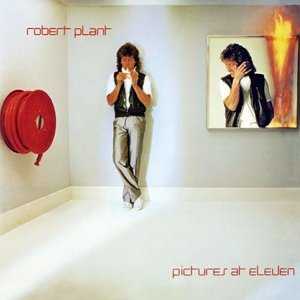 | Album: 1 of 16 Title: Pictures at Eleven Released: 1982-06-28 Tracks: 8 Duration: 42:11 Scroll: Up Down Top Bottom 25% 50% 75% Spotify TrackSamples Allmusic AlbumCover | 1 Burning Down One Side (03:57) 2 Moonlight in Samosa (04:01) 3 Pledge Pin (04:03) 4 Slow Dancer (07:45) 5 Worse Than Detroit (05:58) 6 Fat Lip (05:08) 7 Like I’ve Never Been Gone (05:59) 8 Mystery Title (05:16) |
| Pictures at Eleven : Allmusic album Review : For his debut solo album, Robert Plant doesnt exactly succumb to everyones expectations. With a less-potent vocal style, Plant manages to carry out most of the songs in smooth, stylish fashion while rocking out rather convincingly on a couple of others. He gets some pretty good help from guitarist Robbie Blunt, who truly comes to life on "Worse Than Detroit," and both Phil Collins and Cozy Powell give Plant enough of a solid background to lean his sultry yet surging rock voice against. Plant channels his energy quite effectively through songs like "Pledge Pin" and "Moonlight in Samosa," while the single "Burning Down One Side" is a creditable one, even though it failed to crack the Top 50 in both the U.K. and the U.S. The most apparent characteristic about the albums eight tracks is the fact that Plant is able to escape most of his past and still sound motivated. Without depending too much on his Led Zeppelin days, he courses a new direction without changing or disguising his distinct vocal style whatsoever. Pictures at Eleven peaked within the Top Five on both sides of the Atlantic, successfully launching Plants solo career. | ||
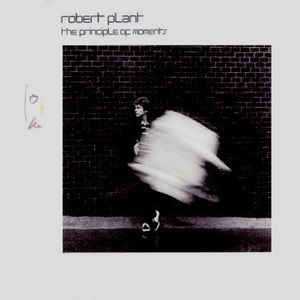 | Album: 2 of 16 Title: The Principle of Moments Released: 1983-07-11 Tracks: 8 Duration: 38:51 Scroll: Up Down Top Bottom 25% 50% 75% Spotify TrackSamples Allmusic AlbumCover | 1 Other Arms (04:20) 2 In the Mood (05:22) 3 Messin’ With the Mekon (04:38) 4 Wreckless Love (05:15) 5 Thru’ With the Two Step (05:31) 6 Horizontal Departure (04:21) 7 Stranger Here... Than Over There (04:19) 8 Big Log (05:03) |
| The Principle of Moments : Allmusic album Review : Robert Plants follow-up to Pictures at Eleven implements much of his debuts style and vocal meandering into a new and more exciting bunch of songs. The mysteriousness of "Big Log," the albums first single, reached the Top 20 in the United States and in the U.K., while "In the Mood" is The Principle of Moments finest offering, proving that Plant could roam freely with his voice and still have it work effectively. But Plant doesnt stop here, as he gives tracks like "Wreckless Love," "Stranger Here...Than Over There," and "Other Arms" an equal amount of curt abstractness and rock appeal. Because Plants voice is so compelling in any state, the convolution of his writing tends to take a back seat to his singing in most of his solo work, which is definitely the case in most of the songs here. Plant went on tour with the Honeydrippers within the same year of The Principle of Moments release, adding another facet to his already diverse solo repertoire. | ||
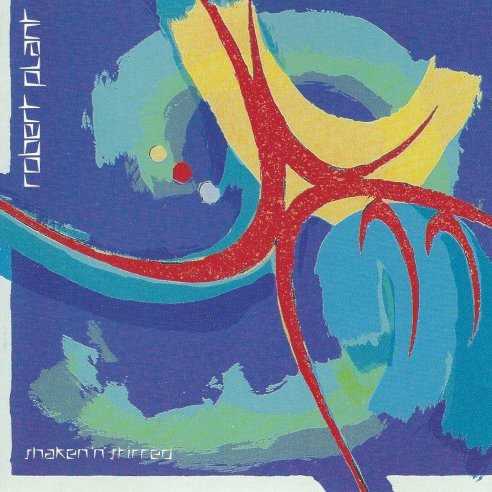 | Album: 3 of 16 Title: Shaken ’n’ Stirred Released: 1985-05-20 Tracks: 10 Duration: 47:19 Scroll: Up Down Top Bottom 25% 50% 75% Spotify Allmusic AlbumCover | 1 Hip to Hoo (04:53) 2 Kallalou Kallalou (04:19) 3 Too Loud (04:10) 4 Trouble Your Money (04:15) 5 Pink and Black (03:49) 6 Little by Little (04:46) 7 Doo Doo a Do Do (05:11) 8 Easily Lead (04:39) 9 Sixes and Sevens (06:01) 10 Little by Little (remixed long version) (05:12) |
| Shaken ’n’ Stirred : Allmusic album Review : While some of Shaken N Stirreds makeup includes typical keyboard pop/rock, theres still plenty of variance, both vocally and otherwise, to keep the album from going under. The album cracked the Top 20 in the U.S. and in Britain thanks to the keen finesse of "Little by Little," which spreads out Plants vocal puissance across an attractive rhythm. This time around, drummer Richard Hayward from Little Feat adds some percussive texture to a mixture of world beats, unconventional melodies and rhythms, and a number of other creative and colorful musical nuances. Some of the music sounds a little foreign and profound at first, but efforts like "Hip to Hoo" and "Kallalou" grow to be impressive, beyond-the-norm-styled numbers after a few listens. Plants decision to create a non-commercial type of rock album proved that he could step outside his typical rock & roll roots and still make some appealing music, yet many fans found the album to be too dense and too experimental upon its initial release. Plants voguish character is still ingrained throughout the tracks, and his tangents arent so overwhelming that they throw his material in an altogether complete direction. If anything, the songs on Shaken N Stirred are an inspiring venture for Plant, as he manages to fulfill his slightly off-centered approach with some interesting and catchy results. | ||
 | Album: 4 of 16 Title: Now and Zen Released: 1988-02-23 Tracks: 10 Duration: 47:02 Scroll: Up Down Top Bottom 25% 50% 75% Spotify TrackSamples Allmusic AlbumCover | 1 Heaven Knows (04:05) 2 Dance on My Own (04:30) 3 Tall Cool One (04:40) 4 The Way I Feel (05:40) 5 Helen of Troy (05:06) 6 Billy’s Revenge (03:34) 7 Ship of Fools (05:01) 8 Why (04:14) 9 White, Clean and Neat (05:28) 10 Walking Towards Paradise (04:40) |
| Now and Zen : Allmusic album Review : After years of trying to separate himself from his legendary status as Led Zeppelins frontman, Robert Plant finally reconciles with his past on Now & Zen. He borrows a few Zeppelin riffs, and even enlists Jimmy Page to play guitar on his hit "Tall Cool One." This album is also notable in that it marks his first collaboration with keyboardist Phil Johnstone, who would continue to play and write with Plant on subsequent albums. Musically, the album relies on standard rock arrangements except that the vocals and drums are at the forefront and keyboards instead of guitars are used to fill out the sound. Although most of the album is comprised of mid-tempo songs aimed at rock radio, Plant includes the lovely ballad "Ship of Fools," which demonstrates that he is more than capable of vocal subtlety. Plant, who often uses mysterious (and mystical) lyrics, writes some of his most direct songs, and the way in which the lyrics complement the melodic arrangements are partially responsible for the commercial success of Now & Zen. This is Robert Plants best solo album, and a must-own for fans of Led Zeppelin. | ||
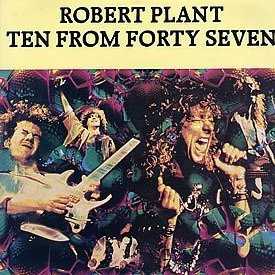 | Album: 5 of 16 Title: Ten From Forty Seven Released: 1990 Tracks: 10 Duration: 46:10 Scroll: Up Down Top Bottom 25% 50% 75% AlbumCover | 1 Heaven Knows (04:05) 2 Burning Down One Side (03:57) 3 Tall Cool One (04:40) 4 Big Log (05:02) 5 In the Mood (05:22) 6 Tie Dye on the Highway (05:17) 7 Pink and Black (03:47) 8 Ship of Fools (05:02) 9 Little by Little (04:45) 10 Hurting Kind (Ive Got My Eyes on You) (04:10) |
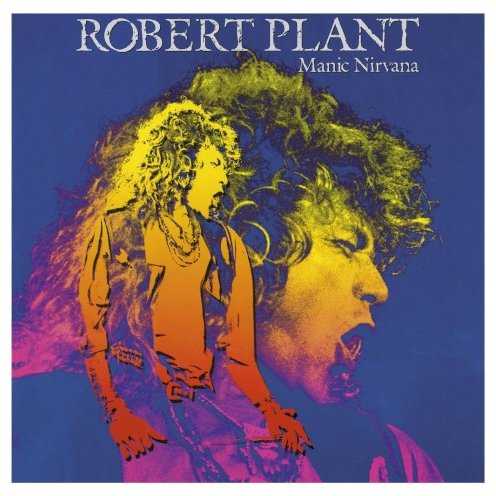 | Album: 6 of 16 Title: Manic Nirvana Released: 1990-03-19 Tracks: 11 Duration: 49:36 Scroll: Up Down Top Bottom 25% 50% 75% Spotify TrackSamples Allmusic AlbumCover | 1 Hurting Kind (I’ve Got My Eyes on You) (04:11) 2 Big Love (04:35) 3 S S S & Q (04:38) 4 I Cried (04:54) 5 She Said (05:13) 6 Nirvana (04:30) 7 Tie Dye on the Highway (05:16) 8 Your Ma Said You Cried in Your Sleep Last Night (04:17) 9 Anniversary (05:02) 10 Liars Dance (02:34) 11 Watching You (04:21) |
| Manic Nirvana : Allmusic album Review : Manic Nirvana essentially continued the revitalized hard rock crunch of Now & Zen. Unlike the previous record, Manic Nirvana played it a little closer to the vest, concentrating on a set of lean, driving riff-rockers instead of ponderous Led Zeppelin pomp. While the overall result is successful -- especially on the frenzied "Hurting Kind," the Technicolor stomp of "Tie Die on the Highway," and the affectionate rockabilly cover "Your Ma Said You Cried in Your Sleep Last Night" -- the album sounds like a holding pattern instead of a step forward. | ||
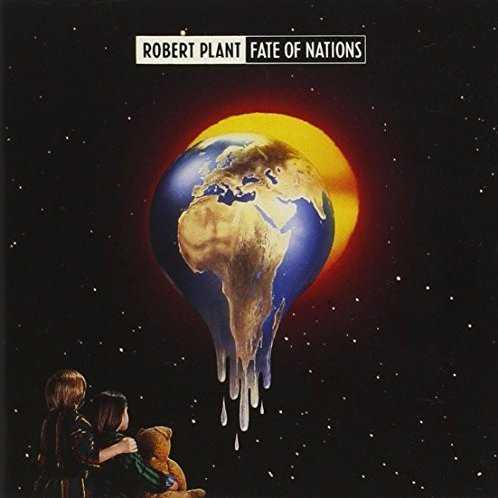 | Album: 7 of 16 Title: Fate of Nations Released: 1993-05-25 Tracks: 16 Duration: 1:18:16 Scroll: Up Down Top Bottom 25% 50% 75% Spotify Allmusic AlbumCover | 1 Calling to You (05:48) 2 Down to the Sea (04:00) 3 Come Into My Life (06:32) 4 I Believe (04:32) 5 29 Palms (04:51) 6 Memory Song (Hello Hello) (05:22) 7 If I Were a Carpenter (03:45) 8 Promised Land (04:59) 9 The Greatest Gift (06:52) 10 Great Spirit (05:27) 11 Network News (06:40) 12 Colours of a Shade (04:45) 13 Great Spirit (acoustic mix) (03:54) 14 Rollercoaster (demo) (04:01) 15 8:05 (01:49) 16 Dark Moon (acoustic) (04:57) |
| Fate of Nations : Allmusic album Review : At first, Fate of Nations seems so light and airy that it slips away through the layers of acoustic guitars, violins, and keyboards. Upon further listenings, more textures appear, and the album gains a calm sense of tension and reflectiveness. Its also Robert Plants most personal record ever; he addresses the death of his son in the beautiful "I Believe." Simultaneously, Fate of Nations is a political album -- "Great Spirit" and "Network News" are two of the most socially conscious songs Plant has ever written. Yet, the album is never heavy-handed and doesnt fall into sermonizing or sentimentality. Plant has always had a folkie heart; on Fate of Nations, he wears it on his sleeve. | ||
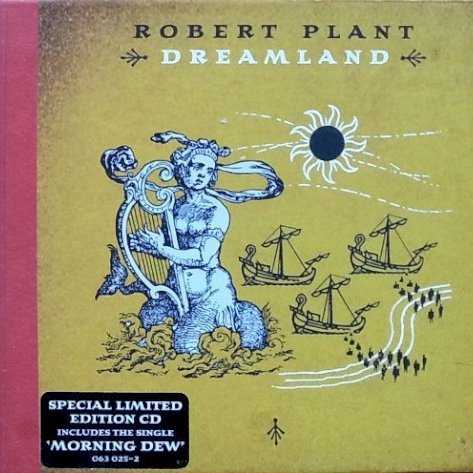 | Album: 8 of 16 Title: Dreamland Released: 2002-06-24 Tracks: 11 Duration: 59:15 Scroll: Up Down Top Bottom 25% 50% 75% Spotify Allmusic AlbumCover | 1 Funny in My Mind (I Believe Im Fixin to Die) (04:45) 2 Morning Dew (04:26) 3 One More Cup of Coffee (04:03) 4 Last Time I Saw Her (04:41) 5 Song to the Siren (05:53) 6 Win My Train Fare Home (If I Ever Get Lucky) (06:03) 7 Darkness, Darkness (07:10) 8 Red Dress (05:24) 9 Hey Joe (07:06) 10 Skips Song (04:54) 11 Dirt in a Hole (04:46) |
| Dreamland : Allmusic album Review : At their best, cover albums have a strange way of galvanizing an artist by returning to the songs that inspired them; the artists can find the reason why they made music in the first place, perhaps finding a new reason to make music. Robert Plants Dreamland -- his first solo album in nearly ten years and one of the best records hes ever done, either as a solo artist or as a member of Led Zeppelin -- fulfills that simple definition of a covers album and goes beyond it, finding Plant sounding reinvigorated and as restless as a new artist. Part of the reason why this album works so well is that he has a new band -- not a group of supporting musicians, but a real band whose members can challenge him because they tap into the same eerie, post-folk mysticism that fueled Led Zeppelin III, among other haunting moments in the Zep catalog. Another reason why this album works so well is that it finds the band working from a similar aesthetic point as classic Zeppelin, who, at their peak, often reinterpreted and extrapolated their inspirations, piecing them together to create something startlingly original. Thats the spirit here, most explicitly on the blues medley "Win My Train Fare Home (If I Ever Get Lucky)," but also throughout the record, as he offers radical reinventions of such cult favorites as Bob Dylans "One More Cup of Coffee," Tim Buckleys "Song to the Siren," and the Youngbloods "Darkness, Darkness," along with such staples as "I Believe Im Fixin to Die" and "Hey Joe." Whats amazing about this album is that it is as adventurous and forward-thinking -- perhaps even more so -- as anything hes ever done. Hes abandoned the synthesizers that distinguished each of his solo albums and replaced them with a restless, searching band that pushes every one of these songs past conventional expectations (and, in the case of the two strong originals, they make the new tunes sound as one with the covers). Dreamland rarely sounds like Led Zeppelin, but its spirit is pure Zeppelin; this, in a sense, is what he was trying to do with the Page and Plant albums -- find a way back into the mystic by blending folk, worldbeat, blues, rock, and experimentalism into music that is at once grounded in the past and ceaselessly moving forward. He might have co-authored only two pieces here, but Dreamland is a fully realized product of his own vision -- as unpredictable and idiosyncratic, as fulfilling and full of mystery as anything hes ever released. | ||
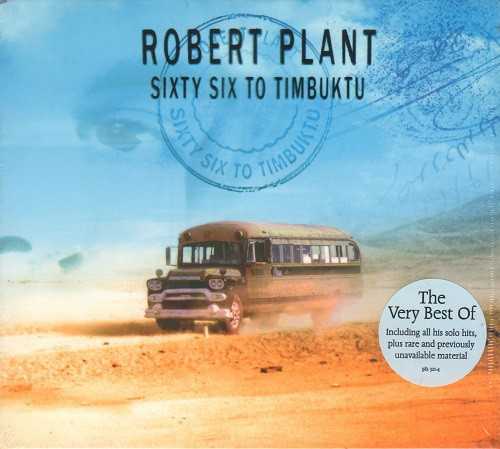 | Album: 9 of 16 Title: Sixty Six to Timbuktu Released: 2003-11-03 Tracks: 35 Duration: 2:27:09 Scroll: Up Down Top Bottom 25% 50% 75% Allmusic Wikipedia AlbumCover | 1 Tie Dye on the Highway (05:09) 2 Upside Down (04:10) 3 Promised Land (04:59) 4 Tall Cool One (04:37) 5 Dirt in a Hole (04:46) 6 Calling to You (05:48) 7 29 Palms (04:51) 8 If I Were a Carpenter (03:45) 9 Sea of Love (03:04) 10 Darkness, Darkness (05:03) 11 Big Log (05:03) 12 Ship of Fools (04:58) 13 I Believe (04:54) 14 Little by Little (04:41) 15 Heaven Knows (04:05) 16 Song to the Siren (04:06) 1 You’d Better Run (02:29) 2 Our Song (02:31) 3 Hey Joe (04:58) 4 For What Its Worth (03:30) 5 Operator (04:36) 6 Road to the Sun (05:35) 7 Philadelphia Baby (02:13) 8 Red for Danger (03:38) 9 Lets Have a Party (03:40) 10 Hey Jayne (05:23) 11 Louie, Louie (02:52) 12 Naked If I Want To (00:46) 13 21 Years (03:30) 14 If Its Really Got to Be This Way (03:59) 15 Rude World (03:45) 16 Little Hands (04:19) 17 Life Begin Again (06:19) 18 Let the Boogie Woogie Roll (02:36) 19 Win My Train Fare Home (live in Timbuktu) (06:15) |
| Sixty Six to Timbuktu : Allmusic album Review : Sixty Six to Timbuktu has to be the icing on the cake for Robert Plant. After Led Zeppelin issued its second live album as well as a spectacular DVD in 2003, his career retrospective outside of the band is the new archetype for how they should be compiled. Containing two discs and 35 cuts, the set is divided with distinction. Disc one contains 16 tracks that cover Plants post-Zep recording career via cuts from his eight solo albums. Along with the obvious weight of his former bands presence on cuts like "Tall Cool One," "Promised Land," and "Tie Dye on the Highway," there is also the flowering of the influence that Moroccan music in particular and Eastern music in general would have on him in readings of Tim Hardins "If I Were a Carpenter," Jesse Colin Youngs "Darkness, Darkness," and his own "29 Palms." There is also a healthy interest in technology being opened up on cuts from Pictures at Eleven and Now & Zen. The sequencing is creative, and the way one track seemingly foreshadows another is rather uncanny. But it is on disc two where the real treasures lie, and they are treasures. Of the 19 selections included, five are pre-Led Zeppelin. And these are no mere dead-dog files. Plant was revealing himself to be a jack-of-all-subgenres master: he drops a burning rendition of the Young Rascals "Youd Better Run" circa 1966, and a wailing version of Billy Roberts "Hey Joe" (recorded in 1967 and rivaling the emotional wallop of Jimi Hendrixs version recorded that same year). Theres also the proto-blues moan and groan of "Operator" with British blues god Alexis Korner from 1968, which foreshadows the following year when he would join Zep. But Plant was not all raw raunch & roll. On Stephen Stills "For What Its Worth," he lays out a paisley hippie sincerity that is downright stirring. And on "Our Song," he takes the example of crooners like Dion and sings a love song, so pure and true it might have come from screen rushes of American Graffiti. These tracks are worth their weight in gold for the integrity in their performances and their rough edges. But these are just the beginning. What comes after the breakup of Led Zeppelin is a smorgasbord of exploratory music from a very restless and confident Plant. Here are outtakes, one-offs, loose ends, and covers that add up to 70 minutes of awesome music. Theres the intense Zep sound-like skronk of "Road to the Sun," with Phil Collins on drums and Robbie Blunt doing his best Jimmy Page, and the shuffling rockabilly of Charlie Richs "Philadelphia Baby," with Dave Edmunds, recorded at Sun Studios in Memphis for the Porkys Revenge soundtrack. On the roots tip theres also Plants contribution of "Lets Have a Party" to The Last Temptation of Elvis compilation, as well as cuts he contributed to the Rainer, Skip Spence, and Arthur Alexander tribute albums. There are B-sides such as "Naked if I Want To" from the U.S. release of "Calling to You," and "Hey Jayne," a limited bonus flip on the U.K. issue of the "I Believe" single from Fate of Nations, as well as a collaboration with the Afro-Celt Sound System on "Life Begin Again." This indulgence of modern technology began earlier than the 1990s, however, as the inclusion of Robin Georges proto-electro "Red for Danger" attests -- the track is previously unreleased. And this is only a smattering. There are cuts from his stint with the Jools Holland big band, the Waynes World soundtrack, and many, many others. Once again, Plants manner of sequencing is full of a crazy wisdom that is as witty as it is aesthetically sound. Finally, something has to be said about Plants wonderfully informative, cocky, and delightfully humorous liner notes. Should he ever decide to give up music, he might become the next Lester Bangs. It all adds up to one hell of a package that provides the best surprise of the season and is a real candidate for reissue of the year. | ||
 | Album: 10 of 16 Title: Mighty Rearranger Released: 2005-05-02 Tracks: 13 Duration: 57:29 Scroll: Up Down Top Bottom 25% 50% 75% Spotify Allmusic AlbumCover | 1 Another Tribe (03:16) 2 Shine It All Around (04:03) 3 Freedom Fries (02:52) 4 Tin Pan Valley (03:46) 5 All the Kings Horses (04:19) 6 The Enchanter (05:27) 7 Takamba (04:05) 8 Dancing in Heaven (04:25) 9 Somebody Knocking (03:46) 10 Red, White and Blue (03:10) 11 Let the Four Winds Blow (04:52) 12 Mighty Rearranger (04:25) 13 Brother Ray / Shine It All Around (The Girls remix) (08:58) |
| Mighty Rearranger : Allmusic album Review : On Mighty Rearranger, the core of the band Robert Plant showcased on 2002s Dreamland -- and named the Strange Sensation -- is a full-blown expanded lineup that shares the bill with him. Guitarists Justin Adams and Skin Tyson, drummer Clive Deamer, keyboardist John Baggot, and bassist Billy Fuller help Plant give listeners his most musically satisfying and diverse recording since, well, Led Zeppelins Physical Grafitti. The reference is not a mere platitude to Plants pedigree. The songs, production, and sequencing of the album overtly incorporates those sounds as well as those of Eastern modalism, Malian folk, guitar rock, R&B, and others, for inspiration -- and why shouldnt they? Mighty Rearranger opens with "Another Tribe," a sociopolitical ballad that touches upon the textural string backdrops from Zeps "Kashmir" and is fueled by Moroccan bendir drums. Adams guitar shifts it over to rock in the middle, but never crowds the crystalline lilting vocal. The single, "Shine It All Around," sports Deamers crunch and crack drums, while Adams canny emulation of Jimmy Pages Les Paul toneography fills Plants sung and moaned lines with ferocity. But it is "Freedom Fries," with its startling percussive syncopation and juxtaposition of roots rockabilly blues and hard rock -- à la "Black Dog" -- that breaks the record wide open and shatters the sensual tension with pure Dionysian RAWK swagger. On "Tin Pan Valley," Baggots whispering keyboard lines under Plants nocturnal moan set a mood -- slippery, sexy, undulating -- before Deamer cracks through with cymbal and snare work that not only emulates John Bonham, but evokes his power, unfurling the Zep talons deeper into the core of the album. The beautiful balladry of "All the Kings Horses" offers solid proof of Plants ability to reference the English folk tradition with elegance and taste, and his continued acumen for fine lyric writing. The acoustic guitars purposely kiss the same space that Page did on "Over the Hills and Far Away" and "Goin to California," but are balanced by Adams pastoral electric country fills. But heres the important part: the Zeppelin spirit that is seemingly ever present here takes nothing away from the startling imagination and creativity on Mighty Rearranger -- it actually serves, rather than houses, the songs it adorns. And its the songs, like the sultry slow stroll of "The Enchanter" and the North African-flavored rocker "Takamba," that matter. Plant and Strange Sensation have painstakingly and energetically crafted an album that takes his full history into account, yet offers something living, breathing, and actually new. This is big rock music making an appearance on the scene agian. Its music that is full of itself, sneers at the competition, and pushes forward by acknowledging the full breadth of the musics tarted-up history. The dramatic "Let the Four Winds Blow" touches everything from early rock & roll to droning Delta blues to biker soundtrack music in a dramatic and utterly serious song. The title track uses the Malian guitar plank and turns it back on itself, pointing its gaze toward John Lee Hooker, Skip James, and the piano blues of Otis Spann. The album closes with Baggots barroom blues piano that propels Plant to pay a brief barrelhouse tribute to Ray Charles on "Brother Ray." Mighty Rearranger is a literate, ambitious, and sublimely vulgar exercise in how to make a mature yet utterly unfettered rock & roll album that takes chances, not prisoners, and apologizes for nothing. | ||
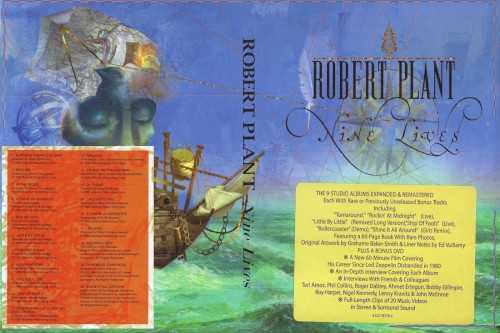 | Album: 11 of 16 Title: Nine Lives Released: 2006-09-12 Tracks: 110 Duration: 8:55:27 Scroll: Up Down Top Bottom 25% 50% 75% Spotify Wikipedia Allmusic AlbumCover | 1 Burning Down One Side (03:58) 2 Moonlight in Samosa (04:01) 3 Pledge Pin (04:03) 4 Slow Dancer (07:47) 5 Worse Than Detroit (05:59) 6 Fat Lip (05:08) 7 Like Ive Never Been Gone (06:00) 8 Mystery Title (05:22) 9 Far Post (04:42) 10 Like Ive Never Been Gone (live) (07:31) 1 Other Arms (04:20) 2 In the Mood (05:22) 3 Messin’ With the Mekon (04:38) 4 Wreckless Love (05:15) 5 Thru’ With the Two Step (05:31) 6 Horizontal Departure (04:21) 7 Stranger Here... Than Over There (04:19) 8 Big Log (05:03) 9 In the Mood (live) (07:35) 10 Thru With the Two Step (live) (11:11) 11 Lively Up Yourself (live) (03:04) 12 Turnaround (04:55) 1 I Get a Thrill (02:42) 2 Sea of Love (03:05) 3 I Got a Woman (02:59) 4 Young Boy Blues (03:33) 5 Rockin’ at Midnight (05:57) 6 Rockin at Midnight (live) (04:14) 1 Hip to Hoo (04:53) 2 Kallalou Kallalou (04:19) 3 Too Loud (04:10) 4 Trouble Your Money (04:15) 5 Pink and Black (03:49) 6 Little by Little (04:46) 7 Doo Doo a Do Do (05:11) 8 Easily Lead (04:39) 9 Sixes and Sevens (06:01) 10 Little by Little (remixed long version) (05:12) 1 Heaven Knows (04:05) 2 Dance on My Own (04:30) 3 Tall Cool One (04:40) 4 The Way I Feel (05:42) 5 Helen of Troy (05:10) 6 Billys Revenge (03:34) 7 Ship of Fools (05:00) 8 Why (04:14) 9 White, Clean and Neat (05:30) 10 Walking Towards Paradise (04:49) 11 Billys Revenge (live) (06:00) 12 Ship of Fools (live) (10:35) 13 Tall Cool One (live) (05:07) 1 Hurting Kind (I’ve Got My Eyes on You) (04:11) 2 Big Love (04:35) 3 S S S & Q (04:38) 4 I Cried (04:54) 5 She Said (05:13) 6 Nirvana (04:30) 7 Tie Dye on the Highway (05:16) 8 Your Ma Said You Cried in Your Sleep Last Night (04:17) 9 Anniversary (05:02) 10 Liars Dance (02:34) 11 Watching You (04:26) 12 Oompa (Watery Bint) (05:47) 13 One Love (03:14) 14 Dont Look Back (03:01) 1 Calling to You (05:48) 2 Down to the Sea (04:00) 3 Come Into My Life (06:32) 4 I Believe (04:32) 5 29 Palms (04:51) 6 Memory Song (Hello Hello) (05:22) 7 If I Were a Carpenter (03:45) 8 Promised Land (04:59) 9 The Greatest Gift (06:52) 10 Great Spirit (05:27) 11 Network News (06:40) 12 Colours of a Shade (04:45) 13 Great Spirit (acoustic mix) (03:54) 14 Rollercoaster (demo) (04:01) 15 8:05 (01:49) 16 Dark Moon (acoustic) (04:57) 1 Funny in My Mind (I Believe Im Fixin to Die) (04:45) 2 Morning Dew (04:26) 3 One More Cup of Coffee (04:03) 4 Last Time I Saw Her (04:41) 5 Song to the Siren (05:53) 6 Win My Train Fare Home (If I Ever Get Lucky) (06:03) 7 Darkness, Darkness (07:10) 8 Red Dress (05:24) 9 Hey Joe (07:06) 10 Skips Song (04:54) 11 Dirt in a Hole (04:46) 12 Last Time I Saw Her (remix) (03:24) 1 Another Tribe (03:16) 2 Shine It All Around (04:03) 3 Freedom Fries (02:52) 4 Tin Pan Valley (03:46) 5 All the Kings Horses (04:19) 6 The Enchanter (05:27) 7 Takamba (04:05) 8 Dancing in Heaven (04:25) 9 Somebody Knocking (03:46) 10 Let the Four Winds Blow (04:52) 11 Mighty Rearranger (04:25) 12 Brother Ray (01:19) 13 Red, White and Blue (03:10) 14 All the Money in the World (03:12) 15 Shine It All Around (The Girls remix) (07:35) 16 Tin Pan Valley (Girls remix) (06:20) 17 The Enchanter (Unkle reconstruction) (06:49) |
| Nine Lives : Allmusic album Review : Too much of a good thing? Perhaps. Nine Lives contains remastered versions of all of Robert Plants studio recordings, from Pictures at Eleven (1982) to Mighty Rearranger (2005), with bonus cuts and a DVD containing an hourlong film that covers the career gamut, with cut-in video clips, a new interview, and, as is Rhinos wont, comments from everybody from Ahmet Ertegun and Bobby Gillespie to Tori Amos and John McEnroe! Nothing appears from the Jimmy Page and Robert Plant recordings. Was this really necessary, especially after the issue of Plants double-disc career retrospective, Sixty Six to Timbuktu, in 2003? His early records used the technology of the day and the first pair, Pictures at Eleven and The Principle of Moments, dipped deep into the production and pop styles of the 80s and mixed them with Led Zeppelins ponderous pomp and circumstance. This also occurred on discs from Shaken n Stirred to the harder-rocking Now & Zen and Manic Nirvana, with stops along the way via the Honeydrippers roots rock cover project that featured the reunion of Jimmy Page with Plant, yes, but also of Page with Jeff Beck. Of course, with Fate of Nations, Plant changed course again, creating a moody, drifty, and dreamy sound -- another portrait of the singer and songwriter that paved the way some nine years later for his resurrection as a recording artist with 2002s Dreamland and a band (Strange Sensation) that found its way with the aforementioned Mighty Rearranger. Plants solo records have been consistently acclaimed, and he has always placed singles in the charts somewhere. Some were received better than others, and some scored big, like 1988s Now & Zen, with its big single, "Tall Cool One." These ten discs reveal Plant to be endlessly searching and endlessly changing without losing the core of who he was as either a singer or a songwriter. He never tried to recreate Led Zeppelin, though he did firmly acknowledge it finally in Mighty Rearranger with guitarist Justin Adams. There isnt anything dour in these records, though some have stood up better to the test of time than others. The first two discs in the set do sound hopelessly dated, and at this point, the Honeydrippers project, played so godawful many times on FM radio, has lost its charm and sounds like a slew of cats having a good time playing standards. Still others, like Now & Zen and Manic Nirvana, sound better somehow than when they were issued -- at those moments in time, rock & roll was seldom played on the radio and these are most assuredly big rock & roll albums. Plant played the game insofar as he made videos and played live, but the albums themselves -- with their huge guitar and edgy synth atmospherics -- are far from nostalgia because of that experimentation with rock & rolls sonics. The story is one that shows how plentifully Plant surrounded himself with textures, space, and -- above all -- a knotty idea of what rock & roll was as it moved through the decades. He nurtured his own vision along some pretty sketchy lines during the volatile 1980s and 90s. In the new millennium, it became safe for rockers of his generation to come home again, from Eric Clapton and the Who to the Moody Blues and even Traffic. (Jeff Beck and the Rolling Stones have never really gone away.) All of this said, it still feels like a lot, maybe over the line. Sure, having these albums in remastered form is a great idea; look for them to follow suit soon -- if Rhinos past marketing track is any gauge -- as individual budget-priced items. There is a very handsome book included with loads of photos and a book-length liner note essay by Ed Vulliamy. The bonus material is nice, but its far from earthshaking or in the least bit revelatory. The listener/consumer is faced with a dilemma: how often will some of these albums get pulled out of the stack and played? Stories like this one get told in the music business to be sure, but in Plants case, his solo career -- no matter how successful -- has always been visible, but still somehow under the radar and second fiddle because of the incredible weight that Led Zeppelins myth carries. Perhaps this set will be acclaimed for what it is, and that would be justice, but its more likely that it will be considered an incomplete excess, which would be not only unfortunate, but very wrong. Certainly there is an argument for the Page & Plant records to be included here, but those, good as they are, are a distraction more than anything else because they are collaborations. For any Plant -- or truly hardcore Zep -- fan who wants the whole solo story presented in a manner that is pristine, revealing, and elegant, this set will be a boon. For the rest, in an age when the "track" is what matters, a box this size will be considered an overblown excess beyond comprehension or consumer demand, and that argument carries more than a bit of weight. | ||
 | Album: 12 of 16 Title: Raising Sand Released: 2007-10-23 Tracks: 13 Duration: 57:27 Scroll: Up Down Top Bottom 25% 50% 75% Spotify Allmusic AlbumCover | 1 Rich Woman (04:05) 2 Killing the Blues (04:17) 3 Sister Rosetta Goes Before Us (03:25) 4 Polly Come Home (05:39) 5 Gone Gone Gone (Done Moved on) (03:34) 6 Through the Morning, Through the Night (04:03) 7 Please Read the Letter (05:55) 8 Trampled Rose (05:34) 9 Fortune Teller (04:32) 10 Stick With Me Baby (02:51) 11 Nothin’ (05:35) 12 Let Your Loss Be Your Lesson (04:02) 13 Your Long Journey (03:55) |
| Raising Sand : Allmusic album Review : What seems to be an unlikely pairing of former Led Zeppelin vocalist Robert Plant and bluegrass superstar Alison Krauss is actually one of the most effortless-sounding duos in modern popular music. The bridge seems to be producer T-Bone Burnett and the band assembled for this outing: drummer Jay Bellerose (who seems to be the session drummer in demand these days), upright bassist Dennis Crouch, guitarists Marc Ribot and Burnett, with Greg Leisz playing steel here and there, and a number of other guest appearances. Krauss, a monster fiddle player, only does so on two songs here. The proceedings are, predictably, very laid-back. Burnett has only known one speed these last ten years, and so the material chosen by the three is mostly very subdued. This doesnt make it boring, despite Burnetts production, which has become utterly predictable since he started working with Gillian Welch. He has a "sound" in the same way Daniel Lanois does: its edges are all rounded, everything is very warm, and it all sounds artificially dated. Sam Phillips "Sister Rosetta Goes Before Us" is a centerpiece on this set. It has her fingerprints all over it. This tune, with its forlorn, percussion-heavy tarantella backdrop, might have come from a Tom Waits record were it not so intricately melodic -- and Krauss gypsy swing fiddle is a gorgeous touch. There is an emptiness at the heart of longing particularly suited to Krauss woodsy voice, and Plants harmony vocal is perfect, understated yet ever-present. Its the most organically atmospheric tune on the set -- not in terms of production, but for lyric and compositional content. Stellar. Plants own obsession with old rockabilly and blues tunes is satisfied on the sets opener, "Rich Woman," by Dorothy LaBostrie and McKinley Miller. Its all swamp, all past midnight, all gigolo boasting. Krauss harmony vocal underscores Plants low-key crooned boast as a mirror, as the person being used and who cant help it. Rollie Salleys "Killing the Blues" is all cough syrup guitars, muffled tom toms, and played-in-bedroom atmospherics. Nonetheless, the two vocalists make a brilliant song come to life with their shared sorrow, and its as if the meaning in the tune actually happens from the bitter irony in the space between the two vocalists as the whine of Leiszs steel roots this country song in the earth, not in the white clouds reflected in its refrain. There are a pair of Gene Clark tunes here as well. Plant is a Clark fan, and so its not a surprise, but the choices are: "Polly Come Home" and "Through the Morning, Through the Night" come from the second Dillard & Clark album from 1969 with the same title as the latter track. The first is a haunting ballad done in an old-world folk style that Clark would have been proud of. It reflects the same spirit and character as his own White Light album, but with Plant and Krauss, the spirit of Celtic-cum-Appalachian style that influenced bluegrass, and the Delta blues that influenced rock, are breached. "Through the Morning, Through the Night" is a wasted country love song told from the point of view of an outlaw. Plant gets his chance to rock -- a bit -- in the Everly Brothers "Gone Gone Gone (Done Moved On)." While it sounds nothing like the original, Plants pipes get to croon and drift over the distorted guitars and a clipped snare; he gets to do his trademark blues improv bit between verses. To be honest, it feels like it was tossed off and, therefore, less studied than anything else here: its a refreshing change of pace near the middle of the disc. It "rocks" in a roots way. "Please Read the Letter" is written by Plant, Page Charlie Jones, and Michael Lee. Slow, plodding, almost crawling, Krauss harmony vocal takes it to the next step, adds the kind of lonesome depth that makes this a song whispered under a starless sky rather than just another lost love song. Waits and Kathleen Brennans "Trampled Rose," done shotgun ballad style, is, with the Phillips tune, the most beautiful thing here. Krauss near the top of her range sighs into the rhythm. Patrick Warrens toy piano sounds more like a marimba, and his pump organ adds to the percussive nature of this wary hymn from the depths. When she sings "You never pay just once/To get the job done," this skeletal band swells. Ribots dobro sounds like a rickety banjo, and it stutters just ahead of the bass drum and tom toms in Belleroses kit. Naomi Nevilles "Fortune Teller" shows Burnett at his best as a producer. He lets Plants voice come falling out of his mouth, staggering and stuttering the rhythms so they feel like a combination of Delta blues, second-line New Orleans, and Congo Square drum walk. The guitar is nasty and distorted, and the brush touches with their metallic sheen are a nice complement to the bass drums. It doesnt rock; it struts and staggers on its way. Krauss wordless vocal in the background creates a nice space for that incessant series of rhythms to play to. The next three tunes are cagey, even for this eclectic set: Mel Tillis awesome ballad "Stick with Me Baby" sounds more like Dion & the Belmonts on the street corner on cough syrup and meaning every word. There is no doo wop, just the sweet melody falling from the singers mouths like an incantation with an understated but pronounced rhythm section painting them singing together in front of a burning ash can. This little gem is followed by a reading of Townes Van Zandts "Nothin" done in twilight Led Zeppelin style. It doesnt rock either. It plods and drifts, and crawls. Krauss fiddle moans above the tambourine, indistinct and distorted; low-tuned electric guitars and the haunted, echoing banjo are a compelling move and rescue the melody from the sonic clutter -- no, sonic clutter is not a bad thing. The weirdest thing is that while its the loudest tune on the set, it features Norman Blake on acoustic guitar with Burnett. This is what singer/songwriter heavy metal must sound like. And it is oh-so-slow. The final part of the trilogy of the weird takes place on Little Milton Campbells "Let Your Loss Be Your Lesson," a jangly country rocker in the vein of Neil Young without the weight and creak of age hindering it. Krauss is such a fine singer, and she does her own Plant imitation here. She has his phrasing down, his slippery way of enunciating, and you can hear why this was such a great match-up. The band can play backbone slip rockabilly shuffle with their eyes closed and their hands tied behind their backs, and they do it here. Its a great moment before the close. The haunting, old-timey "Your Long Journey by A.D. and Rosa Lee Watson," with its autoharp (played by Mike Seeger no less), Riley Baugus banjo, Crouchs big wooden bass, and Blakes acoustic guitar, is a whispering way to send this set of broken love songs off into the night. These two voices meld together seamlessly; they will not be swallowed even when the production is bigger than the song. They dont soar, they dont roar, they simply sing songs that offer different shades of meaning as a result of this welcome collaboration. | ||
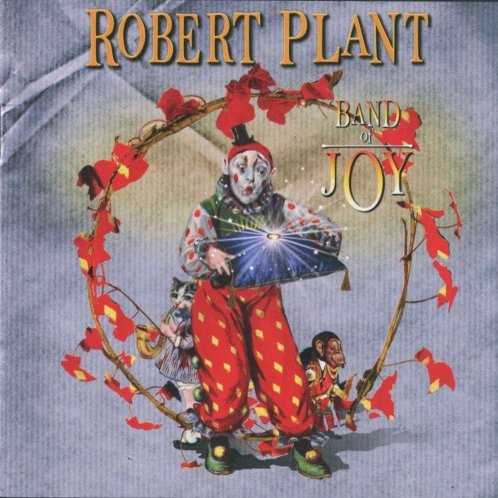 | Album: 13 of 16 Title: Band of Joy Released: 2010-09-10 Tracks: 12 Duration: 48:02 Scroll: Up Down Top Bottom 25% 50% 75% Spotify Allmusic AlbumCover | 1 Angel Dance (03:52) 2 House of Cards (03:15) 3 Central Two-O-Nine (02:51) 4 Silver Rider (06:07) 5 You Can’t Buy My Love (03:12) 6 Falling in Love Again (03:39) 7 The Only Sound That Matters (03:46) 8 Monkey (04:59) 9 Cindy, I’ll Marry You Someday (03:38) 10 Harm’s Swift Way (04:20) 11 Satan Your Kingdom Must Come Down (04:14) 12 Even This Shall Pass Away (04:02) |
| Band of Joy : Allmusic album Review : Band of Joy was the name of Robert Plant’s Black Country psychedelic folk group of the late ‘60s and his revival of its name and spirit in 2010 is of no small significance. Certainly, it’s an explicit suggestion that Plant is getting back to his roots, which is true to an extent: the original Band of Joy was unrecorded outside of a handful of demos, so there is no indication of whether this 2010 incarnation sounds anything at all like the ‘60s band but the communal vibe that pulsates throughout this album hearkens back to the age of hippies as much as it is an outgrowth of Raising Sand, Plant’s striking duet album with Alison Krauss. Such blurred borders are commonplace on Band of Joy, where American and English folk meld, where the secular and sacred walk hand in hand, where the past is not past and the present is not rootless. Assisted by co-producer Buddy Miller and a band of roots iconoclasts highlighted by harmonist Patty Griffin, Plant finds fiercely original music within other people’s songs, nabbing two songs from slow-core stalwarts Low, cherry-picking relative obscurities from Richard & Linda Thompson and Los Lobos, digging back to find forgotten songs from the heyday of honky tonk and traditional folk tunes not often sung. Some of these songs feel like they’ve been around forever and some feel fresh, but not in conventional ways: Low’s “Silver Rider” and “Monkey” feel like ancient, unearthed backwoods laments and the riotous “You Can’t Buy My Love” feels as if it was written yesterday. Much of the wonder of Band of Joy lies in these inventive interpretations but the magic lies in the performances themselves. Never as austere as the clean, tasteful impressionism of Raising Sand, Band of Joy is bold and messy, teeming with life to its very core. It’s as a joyous a record as you’ll ever hear, a testament that the power of music lies not in its writing but in its performance. | ||
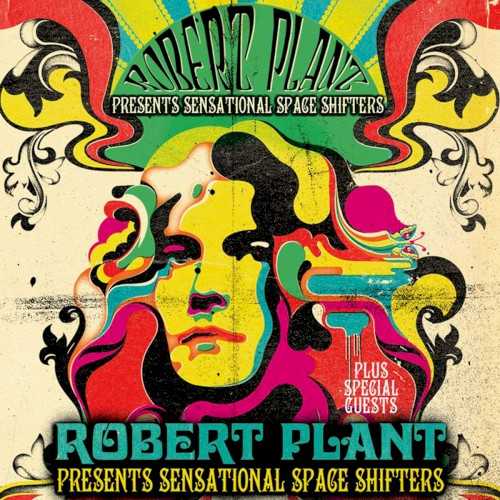 | Album: 14 of 16 Title: Sensational Space Shifters (Live in London July 12) Released: 2012-07-13 Tracks: 15 Duration: 1:29:46 Scroll: Up Down Top Bottom 25% 50% 75% AlbumCover | 1 Fixin To Die (05:07) 2 Tin Pan Valley (06:32) 3 44 (04:30) 4 Friends (05:15) 5 Spoonful (06:47) 6 Bron-Y-Aur Stomp (04:56) 7 Ohio (05:48) 8 No Bad News (04:52) 9 Standing (05:07) 10 Black Dog (07:14) 11 Somebody Knocking (08:48) 12 Witchdoctor (05:55) 13 Whole Lotta Love / Steal Away / Bury My Body (08:06) 14 Another Tribe (04:32) 15 Gallows Pole (06:17) |
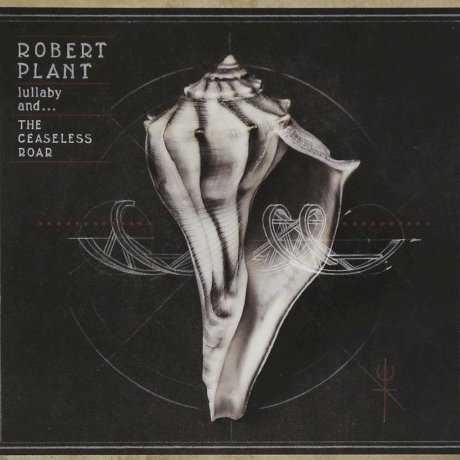 | Album: 15 of 16 Title: lullaby and… THE CEASELESS ROAR Released: 2014-09-05 Tracks: 22 Duration: 1:40:02 Scroll: Up Down Top Bottom 25% 50% 75% Spotify TrackSamples Allmusic AlbumCover | 1 Little Maggie (05:05) 2 Rainbow (04:17) 3 Pocketful of Golden (04:12) 4 Embrace Another Fall (05:52) 5 Turn It Up (04:05) 6 A Stolen Kiss (05:15) 7 Somebody There (04:32) 8 Poor Howard (04:13) 1 House of Love (05:07) 2 Up on the Hollow Hill (Understanding Arthur) (04:35) 3 Arbaden (Maggie’s Babby) (02:46) 1 Little Maggie (05:05) 2 Rainbow (04:17) 3 Pocketful of Golden (04:12) 4 Embrace Another Fall (05:52) 5 Turn It Up (04:05) 6 A Stolen Kiss (05:15) 7 Somebody There (04:32) 8 Poor Howard (04:13) 9 House of Love (05:07) 10 Up on the Hollow Hill (Understanding Arthur) (04:35) 11 Arbaden (Maggie’s Babby) (02:46) |
| lullaby and… THE CEASELESS ROAR : Allmusic album Review : Returning to his native England after an extended sojourn in America, Robert Plant heavily reconnects with his homelands mysticism on 2014s lullaby and... The Ceaseless Roar. Despite the shift in geography, the singer is picking up a thread he left hanging with 2010s Band of Joy. On that album, Plant blurred boundaries between several musical styles, playing covers with a group assembled by producer Buddy Miller, but here he shifts that omnivorous aesthetic to a collection of originals performed with his ever-changing band the Sensational Space Shifters. Certain flourishes sound familiar -- he remains equally enamored of English and Moroccan folk while retaining an enduring obsession with American blues and psychedelia -- but the feel is different, not as robust as Band of Joy or warmly joyous as Raising Sand. The Ceaseless Roar may not get loud -- usually, when it rocks it sounds like a kissing cousin to a folk rave-up; sometimes, as on "Somebody There," its chiming, crystalline, and bright like the Byrds -- but it is intensely meditative, finding sustenance within mystery. Plant is reflecting on where hes been -- singing "And if the sun refuses to shine" on "Pocketful of Golden," he tips a hat to his Zeppelin past; elsewhere he speaks of getting lost in America -- yet gingerly avoiding questions of mortality and resisting the allure of easy sentimentality. Its possible to hear the weight of his years on lullaby and... The Ceaseless Roar -- it is, in the best sense, mature music, dense in its rhythms and allusions, subtle in its melodies -- but he never feels weary, nor does he traffic in false nostalgia. Hes building upon the past, both his own and the larger traditions of his homeland, both spiritual and actual, and that gives lullaby and... The Ceaseless Roar a bewitching depth. Its an album to get lost in. | ||
 | Album: 16 of 16 Title: Carry Fire Released: 2017-10-13 Tracks: 11 Duration: 49:05 Scroll: Up Down Top Bottom 25% 50% 75% Spotify TrackSamples Allmusic AlbumCover | 1 The May Queen (04:14) 2 New World… (03:29) 3 Season’s Song (04:19) 4 Dance With You Tonight (04:48) 5 Carving Up the World Again… A Wall and Not a Fence (03:55) 6 A Way With Words (05:18) 7 Carry Fire (05:25) 8 Bones of Saints (03:46) 9 Keep It Hid (04:07) 10 Bluebirds Over the Mountain (04:58) 11 Heaven Sent (04:42) |
| Carry Fire : Allmusic album Review : Robert Plant opens Carry Fire with "The May Queen," a song that cant help but stir up memories of "Stairway to Heaven," the most mystical number Led Zeppelin ever cut. "The May Queen" doesnt sound a thing like "Stairway to Heaven," which is deliberate. As Plant murmurs about "the dimming of his light," the churning folk-rock -- a rootless, restless gypsy hybrid of American, English, and Middle East traditions -- comes to crest upon a violin line that appears to quote "Prodigal Son," a gospel blues attributed to Robert Wilkins. Its hard not to read this as a sly wink to the audience, a suggestion that Plant, after years of rambling, has returned to where he belongs. Such suspicions are underscored by the fact that Carry Fire is Plants first album in over a decade where hes retained the same supporting crew, recording once again with the Sensational Space Shifters, the same outfit who backed him on lullaby and...The Ceaseless Roar. Where that 2014 record carried a cataclysmic undercurrent -- his return to England bore the full weight of mortality -- Carry Fire is so casual it can even get loud. Guitars ricochet throughout "New World," a slice of hard mysticism that evokes the spacier elements of Zeppelin even as it consciously chooses the spiritual over the carnal. Despite Plants clear favor of the heart and head over primal pleasures, Carry Fire retains a visceral kick, because the singer/songwriter understands the transportive power of music, how the old can seem new when seen with a different light. Take "Bluebirds Over the Mountain," an obscure 45 from the obscure rockabilly singer Ersel Hickey: It was written and recorded in 1958 and cut a decade later by the Beach Boys, but here it sounds as eternal as a mountain spring, a song that was never composed, but rather always existed. Plant surrounds "Bluebirds Over the Mountain" with songs that are equally ageless: Their bones feel old yet the sound is fresh, even if the record makes no concessions to modernity. Carry Fire also doesnt concede to how Plant once wielded tradition as a bludgeon, since every moment of the album is underplayed. Subtlety, once a word never associated with Plant, is now his greatest strength, and Carry Fire carries a real, substantial difference from lullaby, which gained power from its moodiness. Here, Plant doesnt seem quite so melancholy. The very richness of the music bears the weight of a long, unpredictable life, but the albums tenor -- not to mention the songs themselves -- suggests a boundless possibility, and thats why Carry Fire is an album of hope: Plant wears his years proudly, yet hes not concerned with any moment other than the present. | ||